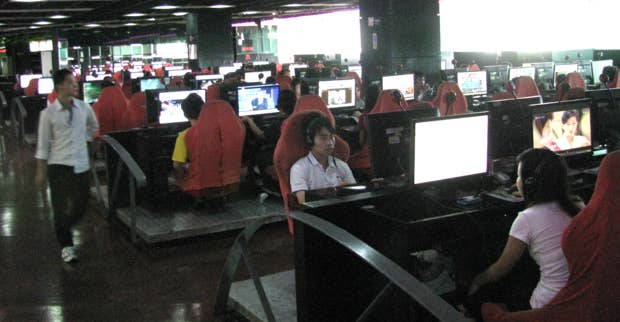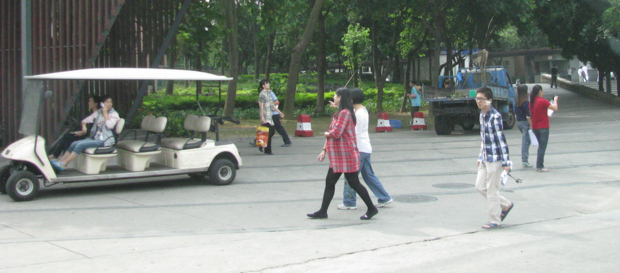
Foxconn. The word no doubt evokes images of miserable proles, and the company has become a Dickensian symbol of the laboring masses in China that produce everything that makes the 21st century the 21st century. What the Nike sweatshop was to the 1990s, Foxconn has become to the 2010s. But if you dig a little deeper, even on Google, the picture becomes slightly more complicated: There are soccer fields and cafes amidst the images of workers assembling iPhones and iPads. Workers complain about bad food and not being able to work as many hours as they'd like.
So I'm somewhat surprised that James Fallows, super-international correspondent for The Atlantic who's spent a lot of time reporting abroad is, well, surprised by what he found at Foxconn. Not because he found previously unreported egregious labor violations or inhumane conditions, but because he found a bunch of people acting rather normal.
I am always surprised by things in China, but this day was at the more-surprising-than-usual end of the spectrum. In the days to come, I will share a series of photos I was able to take on the campus. I will start now, before completing my article, with just a few that set the general mood.

They like watching TVs! and And they drink coffee and put money in the bank.
These are the young people building your smartphones and computers. Or, this kind of scene at lunch hour, with a bunch of employees clustering around a HD big-screen TV being offered at special discount. This is a main street on the campus near a central cafeteria and many shops, banks, coffee bars, and so on.

They also enjoy air conditioning and reading.
Or this -- the "staff care" center, which is supposed to help resolve various personal or social problems. It turns out that most of the Foxconn workers sitting and reading -- actual papers! -- were not looking for help but were just taking advantage of the seats and the air-conditioning while on their lunch break.
He adds in a follow-up post, "I present these as plain quick snapshots. The very banality of the scenes, in this the most famed workhouse in the world, is generally what I found interesting." In other words, it's very much the normality of their lives outside of the factory that Fallows finds surprising and "interesting."
Do they have sex and get pregnant too?

They do!
A group of people walking in the main cafeteria area at lunch time. The guy with the plaid shirt has a bandage on his face; I don't know why. I assumed that the woman in the short red dress is pregnant, but I didn't ask. I just saw them walk by.
Fallows' report no doubt means well, intended to portray the complexity of the lives of Foxconn workers, but the report's own apparent surprise at discovering that complexity is jarring — it's not a new story by any stretch that life at Foxconn is more complicated than the popular imagination would have it.
I asked Joel Johnson, who visited Foxconn for Wired, why we continue to be surprised the people working at Foxconn are in fact people, with real human lives:
First, there's just plain ol' ignorance: images from inside Foxconn's facilities taken by third-parties have been around for at least three or four years. So the information is there if you just Google for it.
Secondly, I think there's a bit of orientalism going on: It's very easy for white or first-world guilt to manifest an image of "poor, unfortunate laborers" in our heads because the archetype of a "sweatshop" is still largely informed by 19th and early 20th century images of labor from the likes of Jacob Riis (in the United States).
All of this isn't to say that Foxconn is a peachy place to live and work: It's employed 14 year olds and increasingly difficult working conditions have led to riots and strikes. Foxconn's CEO has referred to his employees as animals. And as Johnson points out, what surprised him during his visit is that "the appearance of the workers did very little to imply their psychological or existential state of mind: modern people hanging out playing video games and smoking cigarettes might very well still be miserable at their lot in life."
The work Fallows and other journalists have done, and are doing, to tell the world about Foxconn and the lives of its workers is deeply important. But it's possible to report accurately on Foxconn and its employees' living conditions, and to empathize with workers without dehumanizing them — to resist succumbing to the narrative that their sole mode of existence is part of a vast labor machine producing whatever Jony Ive and his team of elves dream up.
